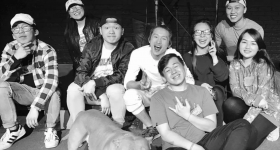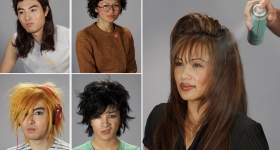2016 has been called a turning point for Asian American representation in media. But in hip-hop, we still have a ways to go. In the 2016 documentary “Bad Rap,” a number of music critics and representatives were asked: “Name one Asian American rapper.” Nearly all were stumped. The one exception suggested Keith Ape — a rapper who isn’t an Asian American, but a Korean national most famous for his 2015 track “IT G MA.”
If “Bad Rap” had been filmed only a few months later, another Asian-but-not-Asian American may have come to mind. Released in early 2016, Indonesian rapper Rich Chigga’s viral hit “Dat $tick” has 31 million views on YouTube, falling just short of “IT G MA”’s 34 million. Beyond the Asian-ness of its creator and its popularity, it shares a number of similarities with “IT G MA.” It is backed by a sparse, strident trap beat. It has been remixed by a well-known black American rapper (Ghostface Killah; A$AP Ferg and Waka Flocka Flame had hopped on “IT G MA”). And finally, it — and especially its music video — has been criticized as culturally appropriative.
In an Inverse interview, the cast of “Bad Rap” expressed their rather complicated views on the popularity of Asian rappers, and this label of “culturally appropriative.” Some seem almost resentful, which is understandable. While rappers like Dumbfoundead and Awkwafina have spent years fighting for Asian American representation, and expertly and sometimes bitterly documenting their struggles through their music, those like Keith Ape and Rich Chigga have achieved overnight success by rapping about booze and glocks and girls — topics that aren’t necessarily apolitical, but may be when removed from the black urban experience. (This isn’t to say that “IT G MA” isn’t political in other ways, but that the vast majority of its fans are drawn to it for Keith Ape’s yelps of, “Underwater squad!” rather than its commentary on Korean–Japanese relations.)
And moreover, they might achieve this recognition in a way that appropriates black culture. Awkwafina mentions in the interview, “When you’re a guy who lives in Singapore who’s never been to the United States, who’s dropping the N-word literally, who’s wearing gold chains, and who can’t even pronounce his rap name in English,” you’re stealing. Reading this interview after “Dat $tick” blew up, it’s hard not to think of Rich Chigga. Not only does his name invoke the N-word, but he quite nonchalantly drops it in the first thirty seconds of “Dat $tick.”
One thing he doesn’t do, however, is wear gold chains. In the video for “Dat $tick,” Rich Chigga wears a pink polo shirt, khaki dad shorts, and a fanny pack. In its follow-up, “Who Dat Be,” he wears a thin necklace over a black turtleneck while stroking a puppy in his lap. His online presence is goofy, offbeat, self-deprecating. In other words, he creates, and embraces, an image of a rap-loving nerd. But for him, this image has different implications than it does for say, Donald Glover. According to a critic at DJBooth, by “contrast[ing] [his] nerdy, non-black, not a gangster self with every trap rap, black, gangster stereotype you can think of,” Rich Chigga “exploit[s] hip-hop, and in the process black artists and black culture.” In other words, he perpetuates and exaggerates stereotypes that so often cause harm to black people: that justify policing black communities, profiling black individuals. When black artists invoke these images, they transform negative stereotypes into resistant identities; when Rich Chigga does, he fails to address the structural, anti-black roots of the violence depicted in rap, misrepresenting what makes the genre so politically rich and artistically valuable.
So why is Rich Chigga so successful, relative to those Asian American rappers who are conscious the dangers of cultural appropriation, and strive to avoid them? One answer is that the public tends to reward cultural appropriation — more specifically, the stripping of black culture from its roots, reducing it to a set of cornrows or plumped lips on a non-black (and usually white) person. Another is that the public can’t accept an Asian who represents their identity in positive terms. So instead, it embraces the foreign, the unintelligible in a Korean-and-Japanese Keith Ape track; or Rich Chigga, who falls into familiar stereotypes of Asian men as emasculated, awkward, nerdy, inherently opposed to blackness. One might find something subversive in Rich Chigga’s cheekily intentional invocation of these images, but it’s easy to be cheeky and intentional about stereotypes when they’re pre-drawn — which not so incidentally, makes them all the easier for Western audiences to digest.
Rich Chigga himself hopes to someday, distance himself from his jokiness. When asked about his name, he “emits a kind of strangled sound” and worries whether “people will take [him] seriously with it.” In fact, to him, “Dat $tick” isn’t a joke: it represents how “crazy shit” — slum violence — happens in Indonesia, too. He had originally planned on playing the music video straight, “dressing up like a rapper, like Post Malone and A$AP Rocky,” but decided that he didn’t want to “look like some scrawny Asian kid that’s trying to be hard.” Hence the digestible, approachable jokiness, which doesn’t quite capture his reality.
Last month in Reappropriate, Mark Tseng Putterman called on Asian Americans to “develop [our own] language and frameworks” to speak about the injustices we face, rather than using those of blacks. I’m sure he would offer the same advice to Rich Chigga: that if he wants to use rap to speak about Indonesia, he should offer something unique, and specific to his experience, to the genre. An easy start would be to drop the N-word (which he plans to do — he seems apologetic for the harm that his usage has caused, if not entirely clear on why).
But then, what next? The process of inventing one’s own language seems long and difficult, particularly when one belongs to an invisible people: underrepresented in Hollywood, subsumed by the black–white binary, lacking a history that is taught in schools. Yet it must be done. And in recent years, many Asian American artists have made their start: Vincent Rodriguez III’s undeniably hunky and uncompromisingly Filipino male lead on television’s Crazy Ex-Girlfriend. Mitski’s indie rock dissection of America’s racialized standards of desirability, flower crowns and all. The SAD ASIAN GIRLS CLUB’s poignant portrayal of Asian American mother–daughter relationships in a video that involves no English words.
Despite these examples, it’s sort of unclear what exactly it means to invent one’s own language. But as tends to be common when deciphering a new concept, considering counterexamples is quite helpful. Here’s one: I grew up in a predominantly Asian neighborhood in the Bay Area, where I heard the word “chink” everywhere — which is, besides the N-word, the other racial slur mixed into Rich Chigga’s name. It was spoken by Asians, to Asians, and without any sense of taboo. In my group of girlfriends, it was heard most commonly after taking a photo: “Ooh, our eyes look so chinky! Can’t have that — let’s take it again.”
While I talk with my friends from home, I cringe at the word, and its use in a context of everyday self-hatred. Currently, it is not one that I would like to be in our Asian American lexicon; I don’t know if it will ever be a term to reappropriate.
I think I cringe harder, however, when I hear the Asian boys with whom I grew up calling each other “nigga.”










Comments